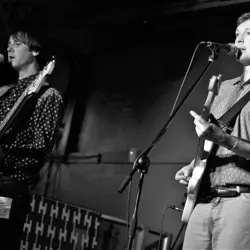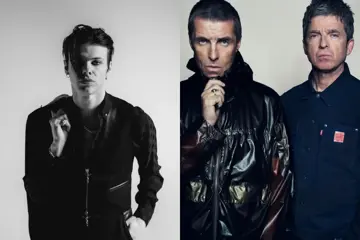 Django Django
Django DjangoThe Guardian awarded Django Django’s self-titled debut album a perfect, five-star rating. Django Django was also nominated for the Mercury Prize in 2012 and the band met fellow nominees Roller Trio (“a jazz band from Leeds in England”) on the award ceremony night. “It was always in the back of my mind to get a saxophone player on a couple of tracks so it was pretty handy,” drummer/producer Dave Maclean recalls of the fortuitous meeting. “I called on [Roller Trio’s] James [Mainwaring] for that middle eight part in [Born Under Saturn album track] Reflections and then a couple of other bits.”
"It was ‘hardcore’, as we called it. It was kind of very fast, very hyperactive, bizarre techno and break beats and a lot of Dutch Gabba"
Enlisting specialist musicians while recording is something one of Maclean’s favourite bands Primal Scream are also known for; notably recruiting Sun Ra Arkestra to play on their stunning, most recent More Light album. Although Maclean admits he’s only seen Primal Scream live “a couple of times”, he gushes, “Screamadelica certainly kind of changed the way I thought about music… We supported Primal Scream at a wee festival in Italy a couple years ago. We played before them and it felt quite cool setting my drum kit up in front of the Primal Scream drum kit with the Screamadelica logo on it. I got quite a buzz outta that.”
Maclean also clearly benefitted from having a brother in a cool band: musician/director John Maclean from The Beta Band (DJ, sampler, keyboards). There’s eight years between them and Dave recalls, “I would kind of, on school holidays, go down to London and DJ for The Beta Band wherever they played and they would take me in the studio. I mean, it was crazy and so much fun.”
He grew up “a bit north of Edinburgh in Dundee” and this scribe’s pretty keen to hear what the rave scene was like up that way. “It was good. It was quite crazy. I mean, it was ‘hardcore’, as we called it. It was kind of very fast, very hyperactive, bizarre techno and break beats, and a lot of Dutch Gabba, I guess. And to me it was sort of... When I hear about people that discovered punk in the ‘70s, for me, in the ‘90s, Detroit techno and dance music was punk music for me because it had the sensibilities of punk – people just making DIY music that was exciting and unpretentious and, you know, fast moving; records were coming out so quickly and it was a great time for music.”
Don't miss a beat with our FREE daily newsletter















